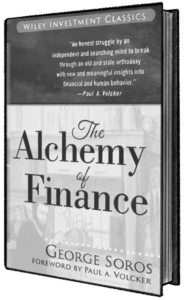Sec Files First Crypto Insider-trading Case
22 July 2022

Hi, The Investor’s Podcast Network Community!
Happy Friday and welcome back to We Study Markets!
Whew! It’s been quite a week and much in the news. Highlights for us include Netflix’s announcement they continue to lose subscribers, Tesla dumping 75% of their bitcoin holdings, and the European Central Bank ending eight years of a negative interest-rate environment.
Today, we’ll also be discussing the SEC’s case against Coinbase and learn from investing legends George Soros and Jim Rogers. All this and more in just 4.5 minutes to read.
Let’s go!
IN THE NEWS
 ECB Ends Negative Interest Rates (Reuters)
ECB Ends Negative Interest Rates (Reuters)
Explained:
- The European Central Bank (ECB) raised interest rates by 50 basis points, or .5%, their first rate increase in 11 years. The move ended eight years of a negative interest-rate environment for the eurozone as the benchmark deposit rate now sits at zero. Concerns about runaway inflation outweighed worries about economic growth as Europe suffers from the impact of Russia’s war in the Ukraine.
- ECB President, Christine Lagarde, said, “we expect inflation to remain undesirably high for some time.” Policymakers at the ECB also agreed to help the eurozone’s biggest debtor countries, primarily Italy, with a new bond purchase scheme called the Transmission Protection Instrument (TPI). The program is designed to stop governments’ excessive rise in borrowing costs.
What to know:
- With inflation rates nearing double digits and skyrocketing past the ECB’s target of 2%, further rate hikes are expected, possibly as soon as September.
- The ECB is in a difficult position, similar to most central banks, which is how to raise rates high enough to stop inflation without taking a sledgehammer to economic growth. It seems unlikely that a zero interest rate environment will be able to quell continued inflation in Europe.
👊 Coinbase Fires Back at the SEC Over First Crypto Insider-Trading Case (CNBC)
Explained:
- An ex-Coinbase product manager and two other employees, were charged by the SEC with wire fraud in connection with an insider trading case. Prosecutors accused the individuals of plotting to profit from listing new tokens to the Coinbase platform before they were announced to the public.
- The SEC claims that 9 of the 25 tokens traded in the case should be considered securities. Coinbase denies they are offering unregistered securities on their platform.
What to know:
- This is the first insider trading case brought by the SEC against the crypto industry. The SEC also has a lawsuit against Ripple and claims their cryptocurrency, XRP, should be treated as a security.
- The process of listing securities, much like shares of stock, involves rigorous disclosure and registration requirements. To date, cryptocurrencies are unregulated and do not come with the same level of scrutiny. The SEC’s classification of digital tokens as unregistered securities could have serious implications for the cryptocurrency industry and expose Coinbase and other platforms to new legal and regulatory requirements. This regulatory clarity has been much needed in the Wild West of the burgeoning crypto industry.
😟 Big Companies Getting Nervous About Job Market (CNN)
Explained:
- Although the job market is healthy and unemployment sits at just 3.6%, some major companies are getting concerned. Apple will be slowing hiring, and Microsoft, Facebook, and Google are implementing hiring freezes. Ford has announced likely job cuts upcoming, and Tesla has already reduced staff.
What to know:
- Companies across a wide range of industries are trying to determine how many workers they will need as there are growing concerns about an economic slowdown. Recession fears may become exacerbated if the Fed raises rates again next week as they battle to bring down inflation.
- Tech, financial services, and the retail sector are the most likely industries to keep an eye on for cutting back on hiring. However, other parts of the economy remain strong, and job postings are still extremely high.
SPONSORED BY
How do you make sure that you are investing with a “good” operator?
Dan Handford and his wife are currently invested in 54 different passive real estate syndications with 16 different operators in 10,000+ doors.
They use this exact list when deciding whether or not to invest with a particular group. Get access to the “7 Red Flags for Passive Real Estate Investing” to be confident in your next investment!
DIVE DEEPER: What is The Theory of Reflexivity?
George Soros is one of the most profitable and powerful investors of our time. He is called “The Man Who Broke the Bank of England” for his famous short sale of $10 billion worth of pound sterling, which netted him a $1 billion profit in 1992. His fund averaged a 31% return for more than 30 years. Forbes has also called him “the most generous giver” of our time, having donated $32 billion of his fortune.
He attributed much of his success to a theory he started developing in the 1950s, which helped him to navigate complex macroeconomic environments. Soros called this the Theory of Reflexivity and discusses how it works in his investing classic, The Alchemy of Finance. It’s a difficult read due to its complexity, but well worth the time and effort. As Paul Volcker said, “On almost every page, you will be rewarded by a paragraph, a sentence, a phrase that will provide fresh insight and challenge your thinking.”
Reflexivity is based on the idea that feedback loops between expectations and economic fundamentals can cause substantial price changes which deviate from equilibrium prices. Human thoughts and emotions are what drive security prices. Since feelings and opinions influence prices, markets are entirely subjective. This makes the collective thinking of all humans in the market affect stock prices, and the results of their thoughts on stock prices further affect how market participants view stock prices. The perception of reality, not reality itself, affect stock prices. This perception then gets priced into markets, and these perceptions affect the underlying companies’ fundamentals.
It’s a little complex, but as Soros himself explained:
“I can state the core idea in two relatively simple propositions. One is that in situations that have thinking participants, the participants’ view of the world is always partial and distorted. That is the principle of fallibility. The other is that these distorted views can influence the situation to which they relate because false views lead to inappropriate actions. That is the principle of reflexivity.”
We can see the idea of reflexivity unfold in the markets daily. The distorted view of market participants leads to different outcomes for securities that do not represent the company’s underlying fundamentals.
Much of Soros’ success came from his contrarian thinking. He did not believe in the Efficient Market Theory and has strongly criticized it. He knew investors are prone to be emotionally irrational, making mistakes and poor decisions. To outperform the market, an investor must determine the flaws in the thinking of other market participants in advance.
What’s a good example of using the theory of reflexivity? One that comes to mind is Michael Burry determining that the consensus view on housing in 2008 was that house prices always go up while also figuring out that combining poor-quality mortgages in with high-quality mortgages doesn’t make that package of mortgages have a AAA credit rating. He bet heavily that these flaws in how most market participants viewed reality would ultimately be revealed and won
big.
There is much more to the Theory of Reflexivity. You can explore further, and more of George Soros’ investing ideas in The Alchemy of Finance, or you can check out Stig Brodersen’s review of the book here.
QUOTE OF THE DAY
“Nearly every time I strayed from the herd I made money. Wandering away from the action is the way to find the new action.”
-Jim Rogers
Meaning
Jim Rogers is a legendary investor who co-founded the Quantum Fund with George Soros. From 1973 to 1980, the fund returned 4,200%, while the S&P advanced only 47% during the same time. He’s a curmudgeonly contrarian who has written several books well worth your time, including Investment Biker, which details his motorcycle trip across six continents, covering over 100,000 miles and earning him a place in the Guinness Book of World Records. Today, the American-born investor lives in Singapore.
Jim is a man who marches to the beat of his own drum both in investing and life. Contrarian investors base their investment philosophy on swimming against the tide. They tend to buy on panic and sell on euphoria. Currently, he says he holds dollars, “not because it’s a sound currency, but because when there is turmoil, people look for a safe haven.” He feels the staggering amount of debt in the world today is a real cause for concern and could lead to a continued bear market. Not what any of us want to hear, but as Jim says, “I have to deal with reality.”
He believes U.S. equities are highly overvalued, as are government bonds, and it may be prudent to look to emerging markets to find opportunities to buy cheap in areas no one else is interested.
Listen to Clay Finck’s chat with James Fletcher about emerging markets here. Rogers also believes commodities will benefit from rising inflation and tense geopolitical developments. Check out more of his recent thoughts on today’s markets here.
We’d love to hear your thoughts! What are some overlooked or despised asset classes that the herd is ignoring?
SEE YOU NEXT TIME!

That’s it for today on We Study Markets!
If you enjoyed the newsletter, keep an eye on your inbox for them on weekdays around 12 pm EST, and if you have any feedback or topics you’d like us to discuss, simply respond to this email.
We’ll see you back here again tomorrow – same place, same time 😉

P.S The Investor’s Podcast Network is excited to launch a subreddit devoted to our fans in discussing financial markets, stock picks, questions for our hosts, and much more! Join our subreddit r/TheInvestorsPodcast today!






